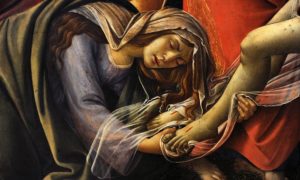Sex sells, but whether it has been at the expense of a woman’s dignity has differed throughout the history of prostitution. Michle Roberts gives an overview of this history, starting from Mary Magdalene and going up to the bourgeoisie culture of the 19th century:

A detail showing Mary Magdalene in Boticellis Lamentation over the Dead Christ. Photograph: Alamy Photograph: Alamy Stock Photo
By the 19th century, in bourgeois culture, the rules had hardened. The individual gets crushed by the weight of the persona of the fallen woman. Novels act as etiquette books. In Jane Austen’s strictly ordered world, a young woman who bears an illegitimate child such as Eliza in Sense and Sensibility sinks further and vanishes. Euphemisms abound. And much as Dickens sympathised with young women forced into prostitution through poverty and tried to help them, he could not actually name Nancys occupation in Oliver Twist.
I love her twist at the end when she suddenly plugs in her own bookThe Walworth Beauty, which challenges our conventional but skewed notions of prostitution and female sexuality.
Read her full post at The Guradian
